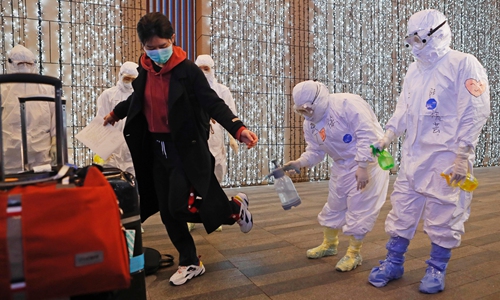HOME >> CHINA
Mainland's only new local patient infected by imported case leads to vigilance over a second outbreak: expert
By Xu Keyue and Liu Caiyu Source:Global Times Published: 2020/3/22 13:35:31
Patient linked to imported case sounds an alarm

Epidemic control staff disinfect an international arrival on Monday night in the Pudong district of Shanghai. The city has established at least 18 quarantine centers for international arrivals' medical observation. Twenty imported COVID-19 cases have been reported in the city. Photo: cnsphoto
The only new local COVID-19 infection in the Chinese mainland on Saturday was confirmed in South China's Guangdong Province, a person who was infected by someone traveling from overseas, the first of its kind in the mainland, reminding cities to raise their vigilance over imported cases to prevent a second wave of infections.
On Sunday, 46 new COVID-19 cases were reported in the mainland, 45 of which were imported, said the National Health Commission. The only new domestic transmission was confirmed in Guangzhou, Guangdong provincial health commission announced on its WeChat account on Sunday.
The patient, a 54-year-old man surnamed Jin, first displayed symptoms on March 17, feeling weak with muscle aches, but no fever. He rested at home, and was confirmed infected on March 21, local health authorities said.
According to contact tracing, Jin had been in close contact with a 34-year-old woman surnamed Lin, who had returned from Turkey on March 9. On arrival, she had passed temperature checks at the airport and was allowed to return home by car. She is reported to have mostly stayed at home and wore a mask.
Lin returned home by car and stayed there most of the time, occasionally doing activities around the home wearing a facial mask. She was confirmed to have been infected with the coronavirus on March 21. Eighteen people who had close contact with Jin have been identified and quarantined.
Guangzhou reported two other confirmed cases, one imported from the Philippines, and the other traveled from Turkey.
People entering Guangzhou from other countries and regions, including travelers from Hong Kong, Macao and Taiwan, are now required to undergo testing for COVID-19 and undergo a 14-day quarantine at home or a designated quarantine center, according to a notice from the local government on Sunday. People who continue to test negative after the quarantine period can be released.
Shanghai allows home quarantine if the person lives alone or all members of the same family need to be quarantined.
The Chinese mainland reported zero new infections for three days from March 18 to 20, while Wuhan has reported zero new infections for four consecutive days.
Meanwhile, the only new local COVID-19 patient infected by an imported case from abroad has led to worries among netizens that there may be a resurgence of the disease in the mainland.
Wuhan virologist Yang Zhanqiu told the Global Times it is unlikely the contagion will reemerge in the Chinese mainland, as entry ports have been strictly screening for possible cases of infection from abroad. However, a domestic case infected by an imported case reflects loopholes in these preventive measures and a failure to cut off these transmission channels, Yang said.
Guangdong should follow the example of Beijing by arranging for anyone coming in from overseas to be sent to designated places for quarantine, whether they have symptoms or not, rather than allowing them to undergo home quarantine, Yang suggested.
Anyone entering Beijing from abroad has to undergo quarantine at designated venues, and no home quarantine is allowed except in special cases such as people traveling with minors, the elderly and people with underlying conditions.
Wang Peiyu, a deputy head of Peking University's school of public health, warned cities in China to raise their vigilance over imported cases.
"At present, new confirmed cases of COVID-19 are mainly imported. The new case of domestic transmission related to an overseas imported case means everyone should raise their vigilance," Wang told the Global Times, noting that it should remind everyone that epidemic prevention cannot be loosened despite the improving domestic situation.
Wang said that the focus on cases in people coming from overseas has only recently become a focus of prevention and control in China, and that there may be problems in coordination between departments which could increase the possibility of infections.
Newspaper headline: Patient linked to imported case sounds an alarm
Posted in: SOCIETY